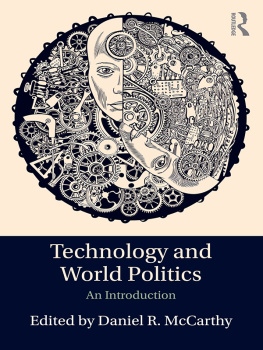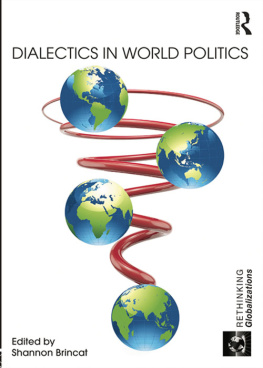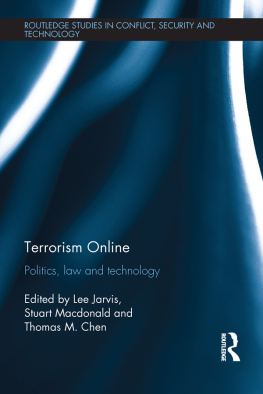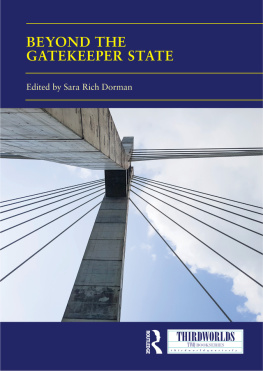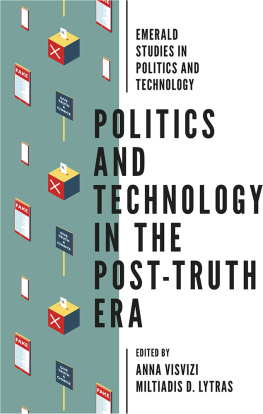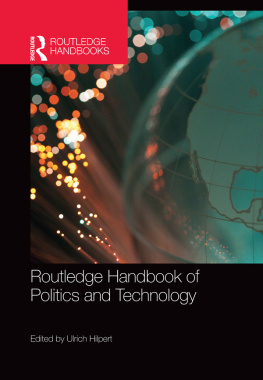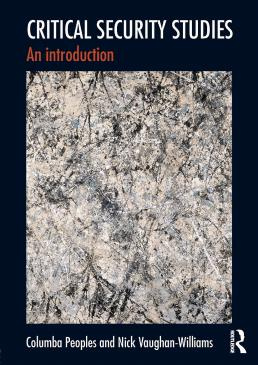This is a fascinating book. It really covers the state of the art in IR research that is at the intersection with work in other fields that consider the intersections of science, technology, and society. The introductory chapters on different approaches to technology studies will be useful to anyone in IR who is unfamiliar with the broader field and most of the chapters on specific technological issues are outstanding.
Craig N. Murphy, Wellesley College, USA
This superb volume strikes new ground in its interdisciplinary approach to technology and global politics. It advances productive intellectual engagements with the sociotechnical systems that characterise our world. Essential reading for anyone interested in the complexities of technology, society and international relations in the 21st century.
Tim Stevens, Kings College London, UK
This fascinating collection showcases recent approaches to theorizing the material in world politics in a manner that is both accessible and highly informative. Essential reading for anyone interested in how technology is shaping, and being employed to shape, ever greater domains of human life. A benchmark work in the renewal of materialism in the study of international relations.
Daniel H. Deudney, Johns Hopkins University, USA
TECHNOLOGY AND WORLD POLITICS
This edited volume provides a convenient entry point to the cutting-edge field of the international politics of technology in an interesting and informative manner. Technology and World Politics introduces its readers to different approaches to technology in global politics through a survey of emerging fusions of Science and Technology Studies and International Relations. The theoretical approaches to the subject surveyed include the Social Construction of Technology, Actor-Network Theory, the Critical Theory of Technology and New Materialist and posthumanist approaches.
Considering how such theoretical approaches can be used to analyse concrete political issues such as the politics of nuclear weapons, Internet governance, shipping containers, the revolution in military affairs, space technologies and the geopolitics of the Anthropocene, the volume stresses the socially constructed and inherently political nature of technological objects. World order is subsequently understood as always socio-technical.
Providing the theoretical background to approach the politics of technology in a sophisticated manner, alongside a glossary and guide to further reading for newcomers, this volume is a vital resource for both students and scholars focusing on politics and international relations.
Daniel R. McCarthy is Lecturer in International Relations in the School of Social and Political Sciences at the University of Melbourne, Australia.
First published 2018
by Routledge
2 Park Square, Milton Park, Abingdon, Oxon OX14 4RN
and by Routledge
711 Third Avenue, New York, NY 10017
Routledge is an imprint of the Taylor & Francis Group, an informa business
2018 selection and editorial matter, Daniel R. McCarthy; individual chapters, the contributors
The right of Daniel R. McCarthy to be identified as the author of the editorial material, and of the authors for their individual chapters, has been asserted in accordance with sections 77 and 78 of the Copyright, Designs and Patents Act 1988.
All rights reserved. No part of this book may be reprinted or reproduced or utilised in any form or by any electronic, mechanical, or other means, now known or hereafter invented, including photocopying and recording, or in any information storage or retrieval system, without permission in writing from the publishers.
Trademark notice: Product or corporate names may be trademarks or registered trademarks, and are used only for identification and explanation without intent to infringe.
British Library Cataloguing in Publication Data
A catalogue record for this book is available from the British Library
Library of Congress Cataloging in Publication Data
A catalog record for this book has been requested
ISBN: 978-1-138-95583-7 (hbk)
ISBN: 978-1-138-95587-5 (pbk)
ISBN: 978-1-31566-601-3 (ebk)
Antoine Bousquet is Senior Lecturer in International Relations at Birkbeck College, University of London. He is author of The Scientific Way of Warfare: Order and Chaos on the Battlefields of Modernity (Hurst, 2009), and has published in Millennium: Journal of International Studies, Cambridge Review of International Affairs and the Journal of International Relations and Development.
Christian Bueger is Reader in International Relations in the Department of Politics and International Relations, Cardiff University. In 2013 he was a visiting fellow at the Centre for Advanced Security Theory, University of Copenhagen; in 2011 a Leverhulme Fellow at the Greenwich Maritime Institute, London; and, prior, a research fellow at the Institute for Development and Peace, Duisburg, Germany (2010). He obtained his PhD in Political and Social Sciences from the European University Institute, Florence, Italy (2010). He has published in International Studies Quarterly, Contemporary Security Policy, European Political Science Review, Global Policy, International Political Sociology, International Studies Perspectives, Journal of International Relations and Development and Third World Quarterly.
Alejandro Cols is Reader in International Relations at Birkbeck College, University of London. He is the author of International Civil Society (Polity, 2002), Empire (Polity, 2007) and editor (with Bryan Mabee) of Mercenaries, Pirates, Bandits and Empires: Private Violence in Historical Context (Hurst, 2011). He has published in the European Journal of International Relations, Millennium: Journal of International Studies and Review of International Studies.
Jairus Victor Grove is Assistant Professor in Political Science at the University of Hawaii Manoa and Director of the Hawaii Research Center for Futures Studies. His research centres on ecology and the future of global warfare. He has published in International Political Sociology, Theory and Event and Critical Studies on Security. His book Savage Ecology: Geopolitics at the End of the World is forthcoming from Duke University Press.
Mary Manjikian is Associate Professor in the Robertson School of Government, Regent University. She is the author of Threat Talk: The Comparative Politics of Internet Addiction (Routledge, 2012) and The Securitization of Property Squatting in Western Europe (Routledge, 2013), in addition to articles in Alternatives, International Studies Quarterly and the International Feminist Journal of Politics.
Joseph P. Masco teaches Anthropology and Science Studies at the University of Chicago. He is the author of The Nuclear Borderlands: The Manhattan Project in Post-Cold War New Mexico (Princeton University Press, 2006), which won the 2014 J.I. Staley Prize from the School of Advanced Research, the 2008 Rachel Carson Prize from the Society for the Social Studies of Science and was the co-winner of the 2006 Robert K. Merton Prize from the Section on Science, Knowledge and Technology of the American Sociology Association. His latest book is

